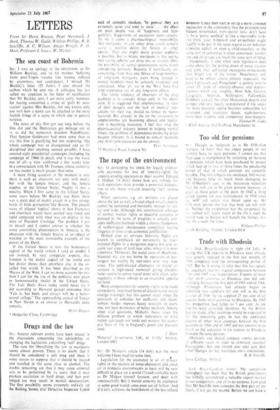Drugs and the law
Sir: Several relevant points have been missed in the discussions concerning the advisability of changing the legislation controlling 'soft' drugs.
The case for liberalising the law re marijuana seems almost proven. There is no doubt that it should be considered a soft drug and there is some reason to suppose that it should be treated and handled in the same class as alcohol. The doubts remaining are that it may cause criminal acts to be performed by its users, that it may produce escalation to hard drugs, and that pro- longed use may result in mental deterioration. The first possibility seems extremely unlikely (at the Rolling Stones trial Detective Inspector Lynch said of cannabis smokers, 'In general they are extremely quiet and tend to smile' . . . the effect on most people was of 'happiness and tran- quillity'). Suggestions of escalation seem .cursory. To me it seems a pharmacological impossibility that marijuana. or any other drug. could actually cause a positive desire for heroin or other opiates That one might desire greater euphoria is possible, but to blame marijuana is like saying that taking caffeine can drive one to alcohol. Only the possibility of mental deterioration seems worth considering seriously. Reports, if scentifically un- convincing. from Asia and Africa of large numbers of long-term marijuana users being treated in mental hospitals must be seriously examined and considered. After all. we in the West have had little experience yet of any long-term effects. The whole tendency of observers of the drug problem is to consider things only in the short- term. It is suggested that amphetamines. in view of their dangers and the lack of medical indi- cations for their use, should no longer be manu- factured. But already in the us the successors to amphetamines are becoming abused and legisla- tion is becoming necessary. I feel that once the pharmaceutical industry turned to helping mental illness, the problem of dependence-producing drugs became. inherent. It is bound to remain recurrent and short-term measures are no answer.
75 Wynford Road. London NI Peter






























 Previous page
Previous page